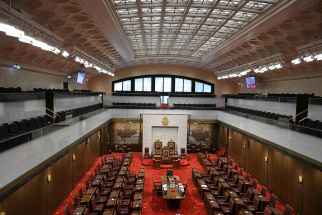Senate shenanigans threaten Indigenous rights bills
Read this article for free:
or
Already have an account? Log in here »
To continue reading, please subscribe:
Monthly Digital Subscription
$1 per week for 24 weeks*
- Enjoy unlimited reading on winnipegfreepress.com
- Read the E-Edition, our digital replica newspaper
- Access News Break, our award-winning app
- Play interactive puzzles
*Billed as $4 plus GST every four weeks. Offer only available to new and qualified returning subscribers. Cancel any time.
Read unlimited articles for free today:
or
Already have an account? Log in here »
Hey there, time traveller!
This article was published 18/06/2019 (2054 days ago), so information in it may no longer be current.
Call it a “made in Manitoba” fight.
For months, a number of bills intended to address inequities faced by Indigenous Peoples in Canada have been making their way through Senate committees and votes, including bills C-91 (addressing Indigenous languages), C-92 (Indigenous child welfare) and C-262 (implementing the United Nations Declaration on the Rights of Indigenous Peoples).
Conservative senators have been employing various stalling tactics, including cancelling meetings and introducing hours of amendments, in an apparent effort to push these bills and others to the brink of cancellation. Any proposed bills not passed before this Friday, when Parliament rises in advance of this fall’s federal election, will die on the floor.
Independent Manitoba Sen. Murray Sinclair, who sponsored C-262, took to Twitter on June 5 to express his frustration: “Senator Don Plett used his authority as Conservative Whip to deny leave to the Aboriginal Peoples Committee to sit and finish Bill C-262 tonight. Delayed again.”
Sen Don Plett used his authority as Conservative Whip to deny leave to the Aboriginal Peoples Committee to sit and finish C-262 tonite. Delayed again. @DonPlett https://t.co/yRXgfhDYde
— Sen Murray Sinclair (@SenSincmurr) June 6, 2019
Mr. Plett, also from Manitoba, responded via tweet: “It took the UN 24 years to pass UNDRIP and Senator Sinclair expects the Senate APPA committee to deal with it in less than 24 days.”
“Yes,” Mr. Sinclair tweeted back, “me and the rest of Canada think two years in the House of Commons and one year in the Senate is long enough.”
A battle between two unelected senators over bills passed by elected officials is remarkable in its own right, but this social-media spat has led to more unprecedented moves.
In a radical show of interest in Senate business, a coalition of church leaders wrote to Conservative senators to demand the stonewalling stop. A group of more than 100 legal experts and academics also penned a collective letter arguing that “the recognition of the human rights of Indigenous Peoples works to strengthen human rights for everyone.”
MPs such as Charlie Angus have also taken to Twitter to call out the senators: “There is a fundamental problem with democracy and reconciliation when this unelected (body) of insiders can attack Indigenous rights in this country.”
Conservative senators are now crying foul, accusing the chairwoman of the Senate’s standing committee on Aboriginal Peoples, Lillian Dyck, of breaking Senate rules to push the bills through. In a rush to beat the clock, C-262 was passed without amendment by the committee on June 11, and C-91 and C-92 were passed this past week. They must now be read a third time by the full Senate and passed before they can be given royal assent and become law.
Former interim Conservative leader Rona Ambrose tweeted last week that she had been told the Tories “will block all legislation” to “make sure #C262 #UNDRIP never passes.”
And the clock continues to tick.
2/3: I’ve been told my party @CPC_HQ will block all legislation including #C337 to make sure #C262 #UNDRIP never passes. Sad day. Especially when #Bill337 could’ve passed more than a year ago with effort from the same people who are now letting it die. #cdnpoli #polcan
— Rona Ambrose (@RonaAmbrose) June 12, 2019
NDP MP Romeo Saganash, who first proposed C-262 in Parliament, said the Conservative senators show “disdain for the human rights of Indigenous Peoples” and “prefer to perpetuate colonialism and injustice” if they kill the bill. He also accused Conservative Leader Andrew Scheer of spearheading the blockage.
In the meantime, Indigenous languages continue to dwindle, Indigenous children remain vastly overrepresented in the child welfare system and Indigenous rights remain in flux in Canada — while unelected senators fight over legislation passed by MPs who were elected by voters.
If this political game continues to its seemingly inevitable conclusion, the losers will be the Indigenous Peoples the bills are intended to empower.









